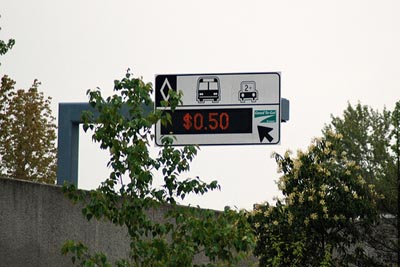Nationally, 76 percent of all commuters drove alone to work in 2007.
The Illinois Tollway’s board of directors recently approved Tomorrow’s Transportation Today, a $1.8 billion plan to relieve traffic congestion by investing in key Interstate to Interstate interchanges and creating dedicated Green Lanes that will encourage more Tollway commuters to consider carpooling, vanpool programs, and express bus services. Green Lanes combine the functions of high-occupancy toll lanes (HOT), high-occupancy vehicle lanes (HOV), and carpool lanes – all of which are helping uncork bottlenecks in states across the country by squeezing more capacity out of existing roadways through variable tolling. The investment includes $1.4 billion for interchange improvements, as well as $400 million to support new transit alternatives for Tollway commuters who don’t want to pay more to drive alone.
To help reduce the annual $7.3 billion hit to the region’s economy caused by gridlock on our roads, transit must play a key role in the overall solution. Every day, 1.4 million vehicles sit in traffic on the Illinois Tollway. Drivers waste a significant amount of time, gasoline and money as they slowly crawl through the sea of traffic. By providing drivers with improved transit alternatives, the new Tollway program can have a significant impact. According to the American Public Transportation Association (APTA), an accessible, reliable transit network can save more than 1.4 billion gallons of gasoline every year and reduce the average household’s expenses by $6,200 annually. By allowing Pace buses to use the Green Lanes, the Tollway is strengthening its connection with transit and taking a great step forward for the region.

Photo Courtesy of Washington State Department of Transportation
FromL.A. to North Carolina, other U.S. regions have had success with similar programs. Seattle’s HOV/HOT lanes move the equivalent capacity of four regular lanes during rush hours. In Houston, more than 40,000 daily commuters use the express transit buses – up from virtually zero transit riders since HOV lanes were first introduced in 1979. North Carolinans who carpool, vanpool, or ride transit cut their commuting costs by approximately $3,000 each year. Both HOV lane users and non-users gave Los Angeles’ system an 88 percent public approval rating. By encouraging carpooling, increasing transit options, and improving connections between tollways and transit routes, commuters benefit from a wide menu of options to fulfill their transportation needs.
The Green Lanes also provide a new opportunity for Pace to help meet the region’s rising transit demands without taking on significant new capital expenses. Express bus service along the Tollway’s dedicated Green Lanes, coupled with new park-and-ride facilities and intermodal centers, will provide commuters with more reliable and accessible transit options and help reduce regional congestion. In coordination with Pace, the Regional Transportation Authority, and Chicago Metropolitan Agency for Planning, the Illinois Tollway’s Green Lanes Plan will help strengthen the connectivity between existing transit services and future regional transportation and land use improvements. As planners explore new alternatives to fight gridlock, making the most of existing infrastructure is an important part of a cost-effective system.
This article was featured in Talking Transit, MPC’s bi-weekly e-newsletter. To receive the newsletter, email talkingtransit@metroplanning.org with ‘Subscribe’ in the subject line.